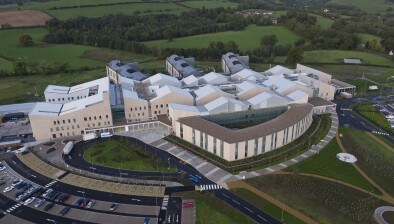Public spending watchdogs to investigate NPD infrastructure finance model

The private finance schemes used to fund Scotland’s roads, schools and hospitals are to be investigated by Audit Scotland and the Accounts Commission to evaluate whether projects offer public value for money.
A joint investigation by The Guardian and the Ferret website has revealed that the Scottish Government’s privately financed Non-Profit Distributing (NPD) programme is expected to cost the equivalent of £932 million in lost expenditure due to an error over interpreting EU rules.
It is understood preparatory work for the investigation, which is due to start in 2018, has already begun.
The NPD programme was brought in by the SNP government with the independent Scottish Futures Trust (SFT) in 2008 to replace the public-private partnership (PPP) model, which itself was set up to replace the private finance initiative (PFI).
It allows private companies to build hospitals, schools and roads with debt finance which is then paid off by the taxpayer over a period of decades. Critics argue that the process costs governments more over the long term and fails to hold private operators to account.
Architect Malcolm Fraser said he was concerned with the financing model and called for the procurement of school buildings to be returned to Scotland’s councils amid the Edinburgh schools crisis earlier this year.
Ministers have been told that four of the biggest NPD projects have to be included in the government’s budget under new European Union accounting rules because they are mostly under government control. Ministers had previously been planning to keep them off the public balance sheet.
According to Audit Scotland, the Aberdeen Western Peripheral Route, of which the completion of a key section has been delayed until winter 2017-18, will now cost taxpayers £469m in capital investment.
The new Dumfries and Galloway Royal Infirmary will cost £213m, the new Edinburgh Sick Kids Hospital will cost £150m, and the new centre for the Scottish National Blood Transfusion Service at Heriot Watt will cost £33m.
The joint investigation by The Ferret and The Guardian has discovered that a fifth NPD project – the new £67m Balfour hospital at Kirkwall on Orkney – is also likely to end up on the public balance sheet, increasing the total amount of capital lost from public sector borrowing to £932m.
The Ferret has also revealed that the Dumfries hospital will earn its private consortium backers – including the insurance group Aviva and the building firm Laing O’Rourke – £160m in interest and fees on a capital cost of £213m, from loans totalling £242m. In recent weeks the hospital has been picketed by the construction workers’ union UCATT in a dispute over union access.
Figures released under freedom of information law show that the NHS is paying interest rates of 5.12 per cent and 11.29 per cent for the Dumfries hospital. Although this is lower than the interest rates charged under the initial PFI schemes, it is much higher than the 1.6 per cent it would be paying to borrow from the state-run national loans fund.
Public finance experts, trade unions and opposition politicians say the findings raise serious concerns about the Scottish Government’s private finance schemes.
Neil Findlay, the Labour MSP and convenor of Holyrood’s health committee, said it reinforced his view there was a strong case for a Holyrood investigation alongside Audit Scotland’s.
“We need to find out who actually owns these so called ‘public services’, who benefits and profits from investment in them, what is the scale of that profit, what is the impact on workers affected by any change in ownership and whether we could do things better in a way that offers far better value for the public pound,” he said.
Jim and Margaret Cuthbert, economists who specialise in investigating private finance projects, said the NPD system could be an improvement on PFI because it should involve greater controls on private profits. But they said the ONS report on the Aberdeen bypass raised concerns over the high finance charges levied under NPD projects.
“There is extremely limited information about what is going on. And that is really probably the biggest problem about activities – the lack of information we have, the lack of accountability,” Jim Cuthbert said.
Caroline Gardner, auditor general at Scotland’s public spending watchdog, said the Scottish Government had to take a far more strategic approach to its investment plans and finances. Gardner said this was a pressing need because the chancellor’s autumn statement last month allocated Scotland an extra £800m in capital funding from the Treasury.
“We will continue to keep a close eye on the Scottish Government’s approach, including its plans for funding its investment programme, and report where appropriate,” she said.
The Scottish Government said the revised EU rules were released after its NPD projects were underway.
A spokesman insisted they still offered value for money, and helped strengthen Scotland’s economy.
“The NPD and hub models are an improvement on previous PFI deals,” he said. “They enable investment in public projects in Scotland to be brought forward more quickly than would otherwise be available through our capital allocation and limited borrowing powers.”
He added: “We have been open and transparent about the impact of classification on the NPD programme and is willing to assist Audit Scotland should they choose to undertake any further review.”

















